古典音乐inaclassicalmusic英文介绍
古典音乐介绍英文版
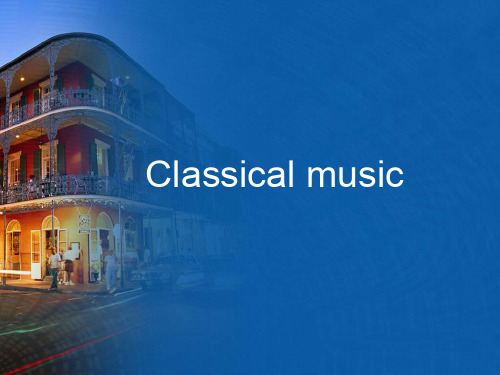
• Heian period(平安时代)
• Joseon(朝鲜) Dynasty
• Renaissance to Early modern Europe
• Khmer(高棉) Empire
History of European classical music
Common practice period
Baroque era 1600–1750
Classical era 1750–1830
Romantic era 1815–1910
Baroque music
•Keyboard music played on the harpsichord and pipe organ became increasingly popular •Violin family of stringed instruments took the form generally seen today •Opera as a staged musical drama began to differentiate itself from earlier musical and dramatic forms •Vocal forms like the cantata and oratorio became more common
• Increasing interest in music by the growing middle classes throughout western Europe spurred the creation of organizations for the teaching, performance, and preservation of music.
古典音乐英文介绍作文
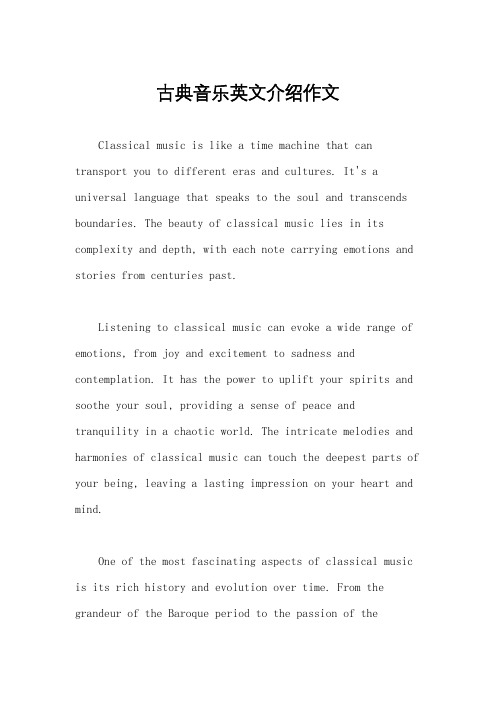
古典音乐英文介绍作文Classical music is like a time machine that can transport you to different eras and cultures. It's a universal language that speaks to the soul and transcends boundaries. The beauty of classical music lies in its complexity and depth, with each note carrying emotions and stories from centuries past.Listening to classical music can evoke a wide range of emotions, from joy and excitement to sadness and contemplation. It has the power to uplift your spirits and soothe your soul, providing a sense of peace andtranquility in a chaotic world. The intricate melodies and harmonies of classical music can touch the deepest parts of your being, leaving a lasting impression on your heart and mind.One of the most fascinating aspects of classical music is its rich history and evolution over time. From the grandeur of the Baroque period to the passion of theRomantic era, each period in classical music has its own unique style and characteristics. The works of famous composers like Bach, Mozart, Beethoven, and Chopin have stood the test of time, continuing to inspire and captivate audiences around the world.Attending a live classical music performance is a truly magical experience that can transport you to another world. The sight of talented musicians playing in perfect harmony, the sound of instruments resonating throughout the concert hall, and the feeling of being surrounded by fellow music lovers all come together to create a sense of unity and connection that is truly special.In conclusion, classical music is a timeless art form that has the power to move and inspire people of all ages and backgrounds. Whether you're a seasoned music lover or a newcomer to the world of classical music, there is something for everyone to appreciate and enjoy. So take a moment to sit back, relax, and let the beautiful melodies of classical music sweep you away on a journey of emotion and imagination.。
介绍古典乐的英语作文

介绍古典乐的英语作文Title: An Introduction to Classical Music。
Classical music is a genre that has stood the test of time, captivating audiences for centuries with its timeless beauty, complexity, and emotional depth. Originating in Western culture, classical music encompasses a vast array of styles, periods, and composers, each contributing to its rich tapestry of melodies and harmonies. In this essay, we will explore the essence of classical music, its history, prominent composers, and enduring legacy.The Essence of Classical Music:Classical music is characterized by its adherence to form, structure, and tradition. Unlike other genres that prioritize improvisation or experimentation, classical compositions are meticulously crafted, often following established musical forms such as sonata-allegro, rondo, or theme and variations. This attention to structure allowsfor the development of intricate musical ideas and themes, creating a sense of coherence and balance within the composition.Furthermore, classical music is renowned for its emotional depth and expressiveness. Composers harness the power of melody, harmony, and dynamics to evoke a wide range of emotions, from joy and exuberance to melancholy and introspection. Whether through the grandeur of a symphony or the intimacy of a solo piano piece, classical music has the ability to resonate with listeners on a profound level, transcending cultural and linguistic barriers.A Brief History of Classical Music:The history of classical music can be traced back to the medieval and Renaissance periods, with the emergence of sacred vocal music such as Gregorian chant and polyphony. However, it was during the Baroque era (1600-1750) that classical music truly flourished, with composers like Johann Sebastian Bach, George Frideric Handel, and AntonioVivaldi making significant contributions to the genre.The Classical era (1750-1820) saw further developments in musical form and style, with composers such as Wolfgang Amadeus Mozart, Ludwig van Beethoven, and Franz Joseph Haydn pushing the boundaries of musical expression. This period gave rise to the symphony, concerto, and sonata, as well as the establishment of the classical orchestra as we know it today.The Romantic era (c. 1820-1900) witnessed a surge in emotional intensity and individualism, with composers like Ludwig van Beethoven, Johannes Brahms, and Pyotr Ilyich Tchaikovsky imbuing their works with a sense of passion and drama. This period also saw the rise of program music, where composers sought to tell stories or evoke imagery through their compositions.The 20th century brought further innovation and experimentation to classical music, with composers such as Igor Stravinsky, Arnold Schoenberg, and Claude Debussy pushing the boundaries of tonality, form, andinstrumentation. This period saw the emergence of new musical movements such as impressionism, expressionism, and serialism, reflecting the rapidly changing cultural landscape of the time.Prominent Composers:Numerous composers have left an indelible mark on the world of classical music, each contributing to its rich legacy with their unique style and vision. Some of the most celebrated composers include:Johann Sebastian Bach: Renowned for his mastery of counterpoint and complex harmonic structures, Bach's music is revered for its intellectual depth and spiritual resonance.Wolfgang Amadeus Mozart: A child prodigy and prolific composer, Mozart's music embodies elegance, clarity, and emotional sensitivity, showcasing his unparalleled melodic gift and technical virtuosity.Ludwig van Beethoven: A revolutionary figure in classical music, Beethoven's compositions epitomize the struggle for individual expression and artistic freedom, transcending the conventions of his time with their boldness and innovation.Franz Schubert: Known for his lyrical melodies and poignant harmonies, Schubert's music exudes a sense of intimacy and emotional intimacy, exploring themes of love, loss, and longing with profound depth and sensitivity.Pyotr Ilyich Tchaikovsky: A master of orchestration and melody, Tchaikovsky's music is characterized by its lush Romanticism and vivid emotional imagery, capturing the essence of the human experience with its passion and intensity.The Enduring Legacy of Classical Music:Despite the passage of time, classical music continues to inspire and captivate audiences around the world, transcending cultural and generational boundaries with itstimeless beauty and universal themes. From concert halls to film scores, classical music remains a vital andinfluential force in contemporary culture, enriching our lives and stirring our souls with its boundless creativity and profound depth.In conclusion, classical music stands as a testament to the enduring power of human creativity and expression. Through its rich history, diverse repertoire, and profound emotional impact, classical music continues to resonate with audiences of all ages and backgrounds, reminding us of the beauty and complexity of the human experience.。
Classical-Music古典音乐(中英对照)
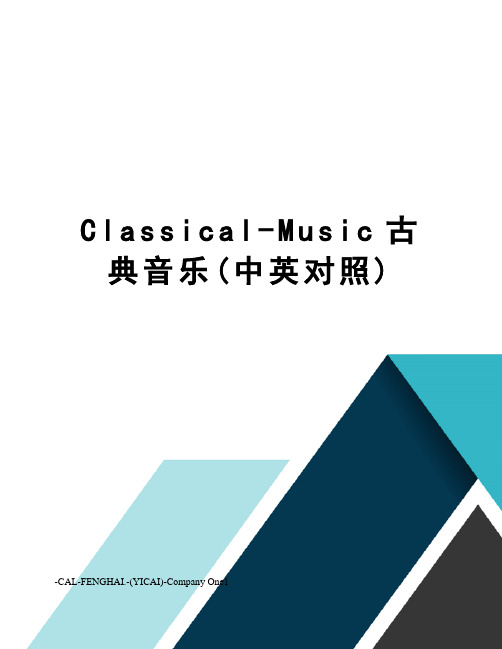
C l a s s i c a l-M u s i c古典音乐(中英对照) -CAL-FENGHAI.-(YICAI)-Company One1Classical Music叶: Many people think that classical music is too esoteric that they are afraid or unwilling to accept it. 古典乐被很多人认为深奥难懂,许多人都不敢或不愿接受古典音乐.In fact, it is not necessary for us to treat classical music with profound knowledge. 其实对待古典音乐,未必要具有高深的音乐知识.Willing to try is a very good beginning. 只要肯尝试接触,就是非常好的开始.With the increasing time of contact, we will naturally know how to appreciate classical music. 只要喜爱古典音乐,随着接触的时间增加,自然就知道如何欣赏了.When a classical music fan gets in touch with music, he or she should have a basic concept, that is, humans’ art is a kind of spiritual activity which needs understanding and communication. 一个古典音乐爱好者,在接触音乐作品时应具备的基本概念是:人类的艺术是一种需要经过了解、沟通,才能够真正进入欣赏层次的心灵活动.汤: Broad classical music refers to western classical music. 广义古典乐指西洋古典乐.Modern music lasted from European Renaissance to early 20th century including all non-pure entertaining modern professional music was collectively referred to classical music. 自文艺复兴时期至二十世纪初出现的现代乐派包括所有非纯粹娱乐性质的现代专业音乐被统称为古典音乐.Narrow classical music refers to European mainstream music from the year 1750 to 1820, which was known as Vienna Classical Music. 狭义的古典乐指1750-1820年时期的欧洲主流音乐,被称为维也纳古典乐派.The three most famous composers in this period were Haydn, Mozart and Beethoven. 此乐派最著名的三位作曲家是海顿、莫扎特和贝多芬.Unlike popular music, classical music has its profound meaning that makes people ponder deeply and lofty.古典音乐不同于流行音乐的地方是它的内涵深刻,能发人深思,更能使人高尚,免于低俗.It is an independent sect with polished artistic and rational emotional expression.它是一个独立的流派,艺术手法讲究洗练,追求理性地表达情感.彭: Western classical music can be divided into three periods. 西方古典音乐大致可分为三个时期.The first period was the Baroque Period which began from the year 1600 and ended with Bach's death in 1750. 第一个时期是巴洛克时期,始于1600年前后,1750年巴赫的逝世标志着巴洛克时期的结束.Unlike the simple and plain music in the Renaissance, music of this period became flashy, complex and full of emotional appeal. 这一时期的音乐一改文艺复兴时期的简洁朴素,变得浮华,复杂,富有感性的吸引力.Vivaldi, Bach and Handel were three famous musicians in this period. 这一时期著名的音乐家有维瓦尔第,巴赫和亨德尔.Their representatives were "Four Seasons", "Matthew Passion", "Al Mira" and so on. 他们的代表作有《四季》、《马太受难曲》和《阿尔米拉》等.伟: The second period was the Classical Period. 第二个时期是古典主义时期.From late 18th century to early 19th century, Haydn, Mozart and Beethoven had made significant contribution to European music history. They were known as Vienna Classical Music School. 18世纪后期至19世纪前期,海顿、莫扎特和贝多芬三位大师对欧洲音乐史产生了重大影响,被后人称为维也纳古典乐派.Their representatives were "Genesis", "Don Juan”, and “Destiny". 他们的代表作有《创世纪》、《唐璜》和《命运》.During this period, modern piano had been gradually improved and appeared on the stage of history. 这一时期,现代钢琴得到逐步完善,登上了历史舞台.Piano sonatas, string quartets and some other new music genre gradually formed and took the place of suite, fugue, concerto and some other old form. 钢琴奏鸣曲、弦乐四重奏等新的音乐体裁逐渐形成,代替了组曲、赋格和大协奏曲等陈旧的形式.马: The last period was the Romanticism Period. 最后一个时期是浪漫主义时期.Musicians in that period paid more attention on the spiritual realm, the expression of subjective feelings and the use of ethnic and folk music. 浪漫时代的音乐家更注重表达人的精神境界与主观感情,更加重视对民族和民间音乐的利用.Chopin, Mendelssohn and Tchaikovsky were the representatives in this period. 此阶段的代表人物有肖邦、门德尔松和柴可夫斯基."Nocturne", "Midsummer Night's Dream" and "Swan Lake" were their well-known works. 他们的代表作主要有《夜曲》,《仲夏夜之梦》和《天鹅湖》.石: The beauty of classical music is that classical music can resonate with human mind.古典音乐的美在于能和人的心灵产生共鸣.Outstanding classical music works were composed by composers with a creative heart of full soul and emotions. 优秀的古典音乐作品都是作曲家将心中的喜怒哀乐全身心投入到音乐中而创作出来的.Mozart died before finishing his work "Requiem". Before he died, he said: "I am writing for my own Requiem". 莫扎特还没完成《安魂曲》的创作便死去了,临死前他说: "我在为我自己写《安魂曲》";Beethoven's "Destiny" expressed his indomitable spirit of struggling with fate;贝多芬的《命运》表达了作者与命运抗争的不屈精神;Saint-Saens's "Swan" revealed the composer's sadness. 圣桑的《天鹅》流露了作者的丝丝哀愁…When you are happy, listening to "Turkish March" will make you happier;在你快乐的时候,听听《土耳其进行曲》会让你感到更加快乐;When you are bored, listening to Chopin's "Nocturne" will sweep your troubles away;在你烦闷的时候,听听肖邦的《夜曲》会使你的烦恼一扫而光;Classical music can temper our soul, purify our heart and enhance our personality. 古典音乐能使我们的灵魂得到锤炼,心灵得到净化,人格得到提升.辉: Western researches have found that classical music is the medicine of curing physical and mental hurt. 西方科研发现,古典音乐是治愈身体与精神伤痛的良药.Slow and gentle classical music can make people get quiet in their mind.缓慢平和的古典音乐会使人在心灵上得到宁静.Music therapists change people's emotions by the huge influence of music on people’s mood.音乐治疗师正是利用音乐对情绪的巨大影响来改变人的情绪的.They usually use a lot of painful or wrathful music to help patients vent negative emotions as much as possible. Then music therapists will gradually use active music to stimulate positive force in patients’ heart and ultimately help them get rid of pain and plight.他们通常会先使用大量悲伤或愤怒的音乐帮助被治疗者尽可能地发泄出消极情绪,然后音乐治疗师会逐渐使用积极的音乐激发被治疗者内心的积极力量,最终帮助他们摆脱痛苦和困境.叶: The beautiful classical music is rich and colorful. Although it is abstract, we can get the maximum enjoyment of beauty with a genuine heart. 古典音乐的美形式多样,丰富多彩,虽然比较抽象,但只要我们用一颗真心体会,就能够得到最大的美的享受.Albert Einstein said: "The world can be formed by the mathematical formula; it can also be formed by the notes." 爱因斯坦说过:这个世界可以由数学公式组成,也可以由音符组成.Mathematics and music, one represents science and one represents art. With mathematics and music, we can grasp the wealth created by human mankind. 数学和音乐,一个代表科学,一个代表艺术.有了它们,就可以把握整个人类所创造的财富.Music is so important to our human beings that we can not imagine what the world would be without music. 由此可见音乐于人类是多么的重要,难以想象没有音乐的世界会是怎样.That is the end of our presentation. Let us enjoy a Polish classical musical cartoon as the end of today’s lecture. 下面让我们欣赏一段波兰古典音乐动画作为今天演讲的结束.。
古典乐介绍英文作文
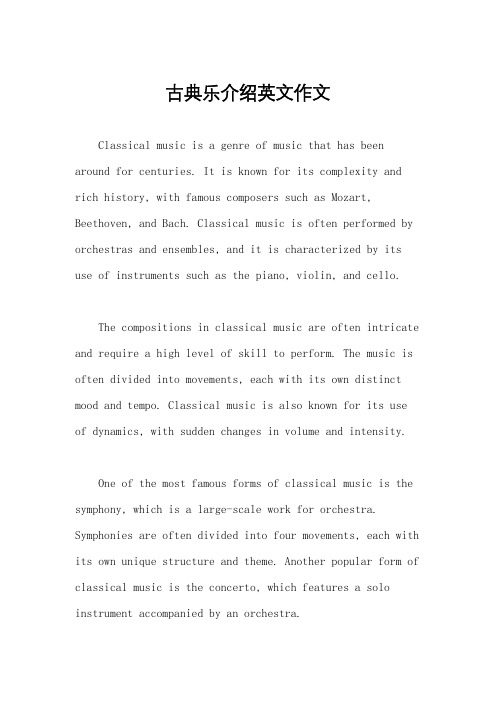
古典乐介绍英文作文Classical music is a genre of music that has been around for centuries. It is known for its complexity and rich history, with famous composers such as Mozart, Beethoven, and Bach. Classical music is often performed by orchestras and ensembles, and it is characterized by its use of instruments such as the piano, violin, and cello.The compositions in classical music are often intricate and require a high level of skill to perform. The music is often divided into movements, each with its own distinct mood and tempo. Classical music is also known for its use of dynamics, with sudden changes in volume and intensity.One of the most famous forms of classical music is the symphony, which is a large-scale work for orchestra. Symphonies are often divided into four movements, each with its own unique structure and theme. Another popular form of classical music is the concerto, which features a solo instrument accompanied by an orchestra.Classical music has had a significant influence on many other genres of music, including jazz, rock, and pop. Many contemporary musicians and composers continue to beinspired by the works of classical composers, and classical music remains an important part of our cultural heritage.。
古典音乐的特点英语作文
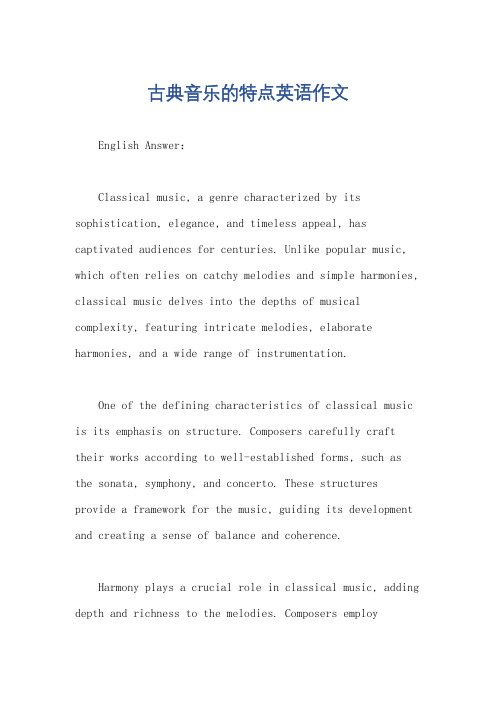
古典音乐的特点英语作文English Answer:Classical music, a genre characterized by its sophistication, elegance, and timeless appeal, has captivated audiences for centuries. Unlike popular music, which often relies on catchy melodies and simple harmonies, classical music delves into the depths of musical complexity, featuring intricate melodies, elaborate harmonies, and a wide range of instrumentation.One of the defining characteristics of classical music is its emphasis on structure. Composers carefully craft their works according to well-established forms, such as the sonata, symphony, and concerto. These structures provide a framework for the music, guiding its development and creating a sense of balance and coherence.Harmony plays a crucial role in classical music, adding depth and richness to the melodies. Composers employsophisticated chord progressions and voice-leading techniques to create a tapestry of sound that is both pleasing to the ear and intellectually stimulating. Modulations to distant keys and the use of chromaticism further enhance the harmonic complexity, adding a sense of drama and emotional depth.Melody, too, holds a central position in classical music. Composers often develop their melodies out of short, recurring motives, which they transform and develop throughout the composition. These motifs act as building blocks, providing a sense of continuity and coherence to the music. Classical melodies are often characterized by their gracefulness, elegance, and emotional expressiveness.Instrumentation is another important element of classical music. Composers often employ a wide range of instruments, from strings and woodwinds to brass and percussion, to create a rich and varied sound. Each instrument has its own unique timbre and expressive possibilities, and composers masterfully combine them to achieve specific musical effects. The orchestra, asignature ensemble in classical music, showcases the full potential of instrumental diversity, allowing for a vast array of textures and colors.Classical music has a long and storied history, dating back to the Baroque period in the 17th century. Throughout history, composers from different eras and cultures haveleft their mark on the genre. From Bach's intricate fuguesto Beethoven's heroic symphonies, from Mozart's elegant operas to Tchaikovsky's sweeping ballets, classical music boasts a diverse and ever-evolving repertoire.Beyond its technical complexities and historical significance, classical music also holds immense emotional power. It has the ability to evoke a wide range of feelings, from joy and exhilaration to sadness and contemplation. Composers use musical elements such as tempo, dynamics, and orchestration to craft emotional landscapes that resonate with listeners on a deep level.Classical music continues to thrive in the 21st century. While it may not enjoy the same level of mainstreampopularity as some other genres, it remains a vibrant and respected art form. It is performed in concert halls around the world, studied in universities and conservatories, and enjoyed by a dedicated and passionate audience.Chinese Answer:古典音乐的特点。
古典音乐特点英语作文

古典音乐特点英语作文英文回答:Classical music, a genre dating back centuries, is characterized by its complexity, sophistication, and enduring beauty. Its distinctive features set it apart from other musical styles and have captivated audiences worldwide for generations.Composition:Classical music is typically composed for orchestras or smaller ensembles, featuring a wide range of instruments, including strings, woodwinds, brass, and percussion. Composers employ complex arrangements and harmonies, often based on classical forms such as sonatas, symphonies, and concertos.Melody and Harmony:Classical music is renowned for its intricate melodies and sophisticated harmonies. Melodies often feature soaring lines, graceful contours, and memorable motifs. Harmonic progressions are often complex and include unexpected resolutions, creating a sense of tension and release.Form and Structure:Classical music adheres to predefined forms and structures, providing a sense of order and coherence. Sonatas typically follow a three-movement form (exposition-development-recapitulation), while symphonies can have multiple movements with contrasting tempos and moods.Dynamics and Articulation:Classical music is characterized by a wide range of dynamics and articulation. Composers use dynamics (volume) to create crescendos, decrescendos, and sudden accents, while articulation (manner of playing) encompasses techniques such as legato, staccato, and trills.Ornamentation and Embellishment:Ornamentation and embellishment are common features in classical music. Composers incorporate trills, grace notes, slurs, and other embellishments to enhance the beauty and complexity of the music.Historical Context:Classical music emerged during the Baroque period(1600-1750), with composers such as Bach, Handel, and Vivaldi. It continued to evolve through the Classicalperiod (1750-1820), characterized by greater elegance and sophistication, with composers such as Mozart and Beethoven. The Romantic period (1820-1910) saw a shift towards more expressive and emotional music, with composers such as Chopin, Brahms, and Tchaikovsky.Modern Influence:Classical music has had a profound influence on subsequent musical styles, including jazz, rock, and pop.Contemporary composers continue to draw inspiration from classical traditions, incorporating elements of complexity, form, and instrumentation into their own works.中文回答:古典音乐的特点。
英语作文 古典音乐
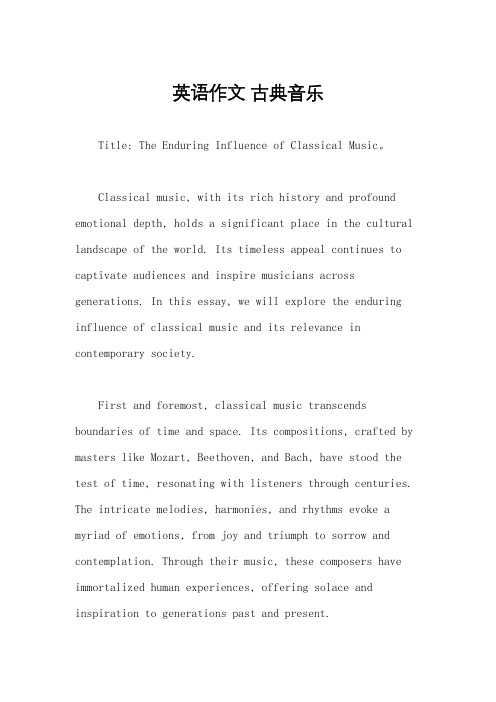
英语作文古典音乐Title: The Enduring Influence of Classical Music。
Classical music, with its rich history and profound emotional depth, holds a significant place in the cultural landscape of the world. Its timeless appeal continues to captivate audiences and inspire musicians across generations. In this essay, we will explore the enduring influence of classical music and its relevance in contemporary society.First and foremost, classical music transcends boundaries of time and space. Its compositions, crafted by masters like Mozart, Beethoven, and Bach, have stood the test of time, resonating with listeners through centuries. The intricate melodies, harmonies, and rhythms evoke a myriad of emotions, from joy and triumph to sorrow and contemplation. Through their music, these composers have immortalized human experiences, offering solace and inspiration to generations past and present.Furthermore, classical music serves as a cornerstone of artistic expression and innovation. Its complex structures and technical virtuosity challenge musicians to push the boundaries of their craft. From solo performances to symphonic orchestras, classical music demands precision, discipline, and creativity. Musicians worldwide aspire to master the works of classical composers, honing theirskills to interpret and convey the nuances of each piece.Moreover, classical music fosters cultural exchange and understanding. Its universal language transcends linguistic barriers, fostering connections among people of diverse backgrounds. Whether performed in grand concert halls or intimate settings, classical music has the power to unite audiences in shared appreciation and reverence. Through collaborative performances and cross-cultural interpretations, musicians bridge divides and cultivate mutual respect for diverse artistic traditions.In addition, classical music enriches education and intellectual development. Its study cultivates criticalthinking, attention to detail, and appreciation for beauty and craftsmanship. Children exposed to classical music at a young age often develop enhanced cognitive abilities and emotional intelligence. Music education programs incorporate classical repertoire, nurturing future generations of musicians and aficionados.Furthermore, classical music inspires interdisciplinary creativity and innovation. Its influence extends beyond the realm of music, permeating literature, visual arts, and film. Countless writers, painters, and filmmakers have drawn inspiration from classical compositions, infusing their works with thematic depth and emotional resonance. From Shakespearean sonnets to cinematic masterpieces, classical music serves as a muse for artistic expression across mediums.In conclusion, classical music endures as a beacon of cultural heritage and artistic excellence. Its timeless appeal transcends boundaries of time, space, and culture, enriching the lives of millions worldwide. From the concert halls of Vienna to the classrooms of budding musicians,classical music continues to inspire, educate, and unite humanity. As we embrace the legacy of classical composers and celebrate their contributions, we honor the enduring power of music to uplift the human spirit and illuminate the beauty of the human experience.。
- 1、下载文档前请自行甄别文档内容的完整性,平台不提供额外的编辑、内容补充、找答案等附加服务。
- 2、"仅部分预览"的文档,不可在线预览部分如存在完整性等问题,可反馈申请退款(可完整预览的文档不适用该条件!)。
- 3、如文档侵犯您的权益,请联系客服反馈,我们会尽快为您处理(人工客服工作时间:9:00-18:30)。
Sheng :made by reed and gourd
Xiao :made by bamboo
Chu
made
by wood
Xun
made by clay
黑陶埙
贝壳埙
Bell -
made by
metal
Sonorous stone –made by stone
Drum
– made
by skin
other.
Flute And Drum At Sunset
House of Flying Daggersg
Autumn Moon Over Han Palace
Wild Geese over
the Clam Sands
Three Stanzas of Plum-blossoms
Dialog Between Fisherman
And Woodcutter
The Eighteen Beat of Wu Gier
A Music From Guangling
Guzheng – Made by silk,a
traditional Chinese musical instrument. It belongs to the zither family of string instruments.
The pipa - is a
plucked Chinese string instrument. The instrument has a pear-shaped wooden body. It has been played for nearly two thousand years of history in China.
High Mountains
And Flowing Streams
High Mountains and Flowing
Streams
It is a gem in the treasure trove of Chinese music. From this name ,you can imagine a harmonious picture with green mountains surrounding you and clear streams quietly passing by your feet. The music is played by Chinese zither. It is slow and quiet, sometimes with rhythm and beats like the flowing water. It is a song in praise of the life-long friendship between Yu Boya, a zither master ,and Zhong Ziqi a woodcutter . The message is that it is not easy for one to find a true friend who can share everything and understand every feeling of the
宫商角徵羽
Pentatonic scale
Chinese music instruments can be categorized into eight classes by the materials they are made from. There are eight kinds of materials: metal , stone, clay, leather, silk, wood, bottle-gourd and bamboo .
There is reed and gourd to make Sheng , bamboo to make Xiao(panpipes), wood to make Chu, silk to make Guzheng, clay to make Xun, metal to make Bell, stone to make Sonorous stone, and skin to make Drum .
Chinese top ten classical songs
• 夕阳箫鼓Flute And Drum At Sunset • 十面埋伏House of Flying Daggers • 阳春白雪White Snow In Sunny Spring • 汉宫秋月Autumn Moon Over Han Palace • 平沙落雁Wild Geese over the Clam Sands • 梅花三弄Three Stanzas of Plum-blossoms • 渔樵问答Dialog Between Fisherman And Woodcutter • 高山流水High Mountains And Flowing Water • 胡笳十八拍The Eighteen Beat of Wu Gier • 广陵散 A Music From Guangling
China classical music is the traditional art or court music of China. It has a long history stretching for more than three thousand years. It has its own unique systems of musical notation, as well as musical tuning and pitch, musical instruments and styles or musical genres.
